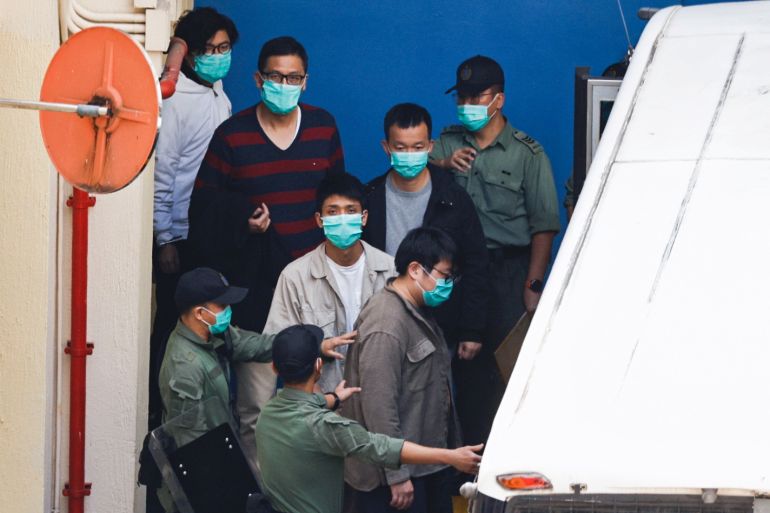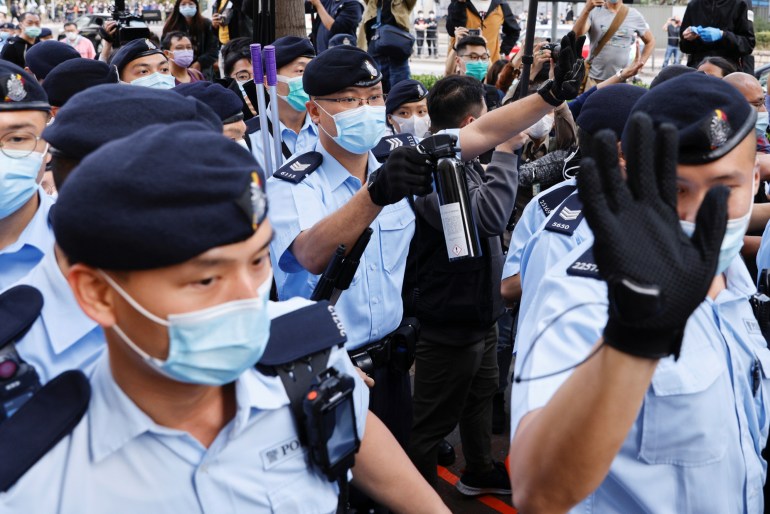Hong Kong ‘subversion’ case resumes after marathon first day
Some 47 pro-democracy politicians and activists are seeking bail after being charged under the national security law.

Court proceedings have resumed for 47 Hong Kong pro-democracy politicians and activists charged with “subversion” under the territory’s China-imposed national security law, following a marathon first-day hearing that was only adjourned after four of the defendants were rushed to hospital.
Defence lawyers are challenging on Tuesday the prosecution’s bid to deny the group bail and keep them in custody for as long as three months while police carry out their investigations. They argue that the group should not have been charged if the case against them was not ready.
Keep reading
list of 4 items‘Freedom, justice’: Why Hong Kong people are moving to the UK
Hong Kong police charge dozens of activists with security crime
Lam defends China’s plan to ensure only ‘patriots’ rule Hong Kong
The defendants represent a broad cross-section of Hong Kong’s opposition, from veteran former pro-democracy lawmakers to academics, lawyers, social workers and youth activists.
Normally such a bail hearing would take little more than a couple of hours.
But Monday’s session extended well beyond midnight as the court struggled to deal with the number of defendants involved as well as the legal vagaries of the broadly-worded security law, which removes the presumption of bail for non-violent crimes.
Democrat and district councillor Clarisse Yeung fainted in the courtroom after midnight and was taken to the hospital by ambulance. In a statement on her Facebook account, Yeung said she passed out after receiving no food for 12 hours and was currently being treated in hospital for low blood pressure.
Local media reported that three other defendants fainted after the hearings were adjourned.
Tuesday’s hearings resumed at lunchtime, but six of the defendants were not in court, public broadcaster RTHK said. Five, including Yeung, were in hospital, while law professor Benny Tai was required at a different hearing, it said.
China imposed the security law on Hong Kong in June last year in what it said was an attempt to “restore stability” in the city in the wake of massive protests against China’s perceived interference in Hong Kong that had turned violent at times.
The law criminalises any act considered to be subversion, secession, terrorism or collusion with foreign forces, and defendants are only allowed bail if they can persuade a court they no longer pose any kind of national security risk.
The alleged offence for the 47 facing subversion charges was organising an unofficial primary election last summer to choose the best candidates for the city’s legislative elections, in the hope that the pro-democracy camp might secure a majority that would enable it to block government legislation and push for universal suffrage.
Chinese and Hong Kong officials have claimed this was an attempt to “overthrow” the city’s government, and therefore a threat to national security.
‘Nothing to do with law’
Critics, including many western powers, say the law is being used to outlaw opposition politics, and accuse China of reneging on promises made when it took control of the territory from the British in 1997.
“This trial has nothing to do with law, it merely shows how the Chinese Communist party nakedly abuses its powers and uses the courts to demonstrate that power,” Nathan Law, a Hong Kong democracy activist who now lives in exile in Britain, said on Facebook on Tuesday.
Human Rights Watch urged the authorities to drop the charges.
“The Chinese government is showing Hong Kong and the world that it stands in direct opposition to human rights and democracy,” said senior China researcher Maya Wang.

Hundreds of people turned out to support the defendants on Monday, chanting slogans such as “Liberate Hong Kong, revolution of our times”. Many dressed in black, in images reminiscent of scenes during the 2019 demonstrations.
The detentions have drawn international condemnation.
US State Department spokesman Ned Price said on Monday Washington called on Hong Kong authorities to release those still held and drop charges against them.
Sweden’s Deputy Consul General Joakim Ladeborn was among those queueing for a seat to observe the trial on Tuesday.
“We are following these cases closely,” he told RTHK. “we are concerned about the implementation of the national security law…”
Beijing’s rubber-stamp national legislature, which drew up the security legislation, convenes later this week for its annual meeting. It is expected unveil new measures to further tighten the rules on the people allowed to take part in the territory’s politics to ensure only those who “love China and love Hong Kong” can govern the territory.
Xia Baolong, who heads China’s office on Hong Kong affairs, said last month only “true patriots” should be allowed in Hong Kong’s executive, legislature and judiciary.